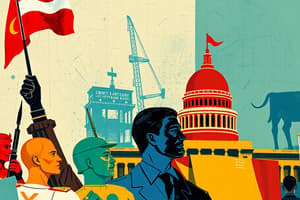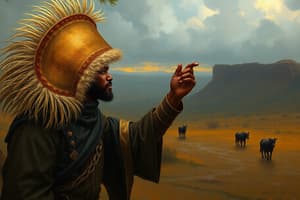Podcast
Questions and Answers
Which event marked the beginning of the Cuban Revolution?
Which event marked the beginning of the Cuban Revolution?
- The signing of the Treaty of Paris
- The assassination of Fidel Castro
- The uprising in 1953 (correct)
- The start of World War II
How did technology impact the role of diplomats?
How did technology impact the role of diplomats?
- Increased the necessity for diplomats
- Enhanced diplomatic negotiations
- Reduced the importance of diplomats (correct)
- Made diplomats obsolete
Which of the following factors influences national morale?
Which of the following factors influences national morale?
- Military strength
- Type of government structure
- Economic stability
- National character (correct)
Which of these ideologies is not mentioned in the content?
Which of these ideologies is not mentioned in the content?
What is indicated as an important aspect of a country's external power?
What is indicated as an important aspect of a country's external power?
What classification of power includes geography, resources, and population?
What classification of power includes geography, resources, and population?
Which of the following best describes scientific and technological power?
Which of the following best describes scientific and technological power?
Which type of power is characterized by economic development and political structure?
Which type of power is characterized by economic development and political structure?
What aspect is NOT part of military power classification?
What aspect is NOT part of military power classification?
Which statement accurately reflects the concept of political power?
Which statement accurately reflects the concept of political power?
In the context of power classification, which is included in external power?
In the context of power classification, which is included in external power?
What element is considered crucial in the quality of population regarding natural power?
What element is considered crucial in the quality of population regarding natural power?
Which of the following is NOT categorized under ideational power?
Which of the following is NOT categorized under ideational power?
Flashcards
Quality of Diplomacy
Quality of Diplomacy
The ability of a state to influence others through peaceful means, such as negotiation, persuasion, and cultural exchange.
Ideology
Ideology
A set of beliefs that guide a nation's political, economic, social, and cultural practices. Examples include liberalism, communism, and socialism.
National Morale
National Morale
National morale reflects the spirit and confidence of a nation's people and is influenced by factors like national character and historical achievements.
External Power
External Power
Signup and view all the flashcards
Intelligence Gathering
Intelligence Gathering
Signup and view all the flashcards
Geographic Power
Geographic Power
Signup and view all the flashcards
Natural Resource Power
Natural Resource Power
Signup and view all the flashcards
Population Power
Population Power
Signup and view all the flashcards
Industrial Power
Industrial Power
Signup and view all the flashcards
Technological Power
Technological Power
Signup and view all the flashcards
Military Power
Military Power
Signup and view all the flashcards
Political Power
Political Power
Signup and view all the flashcards
Bureaucratic Power
Bureaucratic Power
Signup and view all the flashcards
Study Notes
Elements of National Power
- power
Natural Power
- Geography: Climate, topography, location, and size
- Natural resources (raw materials): Raw material theory is declining
- Population: Quality is more important than quantity
Scientific and Technological Power
- Industrial Capacity: Manufacturing industry boosts the economy; both raw materials and manufacturing enhance the country.
- Technology: Technology strengthens nations, provides consumer goods, and creates markets for foreign goods.
Military Power
- Size of military forces
- Quality of military equipment
- Mobility and deployment
- Military leadership
- Morale of armed forces
- Financial resources
Political Power
- Type of Government: Democracy & authoritarian regimes have succeeded in international relations
- Bureaucratic Efficiency: Complete detachment of politics and bureaucracy. Professional bureaucrats carry political decisions.
- Leadership: Great leaders enhance national power. Leaders play crucial roles, utilize factors of national power and determine relationships with other countries (war/peace).
- Quality of Diplomacy: Diplomats are peacetime warriors; France and Britain have strong diplomatic skills; until WWII, US diplomacy was comparatively weak; technology reduced diplomatic importance.
Social and Ideological Power
- Ideology: Political, economic, religious, racial ideologies like Liberalism, Constitutionalism, Communism, Socialism, Nazism, and Internationalism.
- National Morale: National characteristics impact morale, and developed nations tend to have stronger morale.
- Social System and Cohesiveness: Indicators of social disunity (accidents and disasters) are relevant factors.
External Power
- Image and Reputation: Country and leader image matters
- Foreign Support & Dependency: Degree of foreign support and dependency
- International Strategic Position: Apprehension of danger and defense mechanisms influence international status
- Intelligence Gathering: US intelligence gathering is considered excellent.
Studying That Suits You
Use AI to generate personalized quizzes and flashcards to suit your learning preferences.




